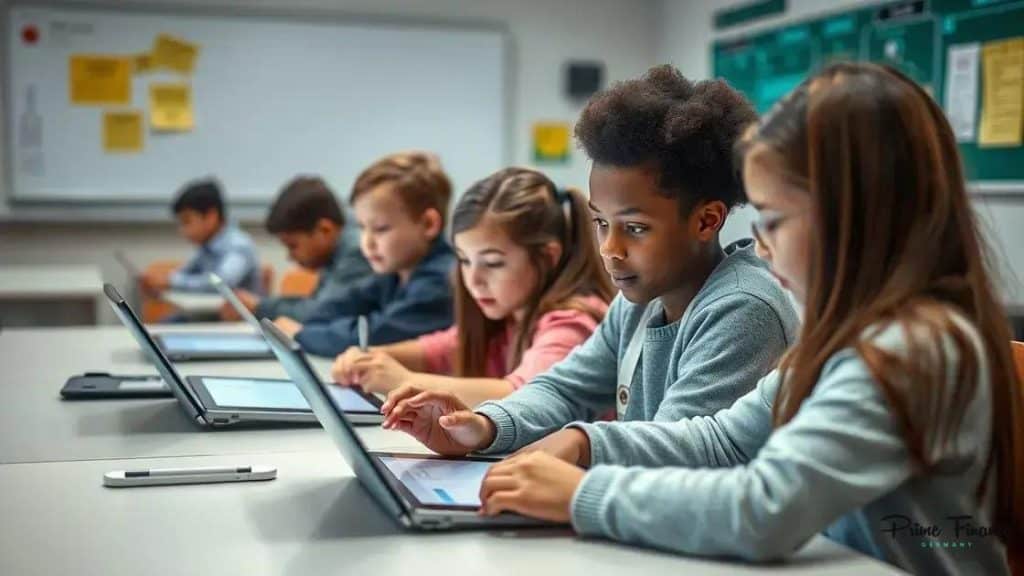AI advancements in personalized learning for education

AI advancements in personalized learning revolutionize education by enhancing student engagement, providing tailored resources, and utilizing predictive analytics to support individual learning needs.
AI advancements in personalized learning for education are changing the way students learn and connect with their studies. Have you ever wondered how technology tailors education to individual needs? This article explores how AI can foster deeper engagement and success.
The role of AI in custom learning environments
The role of AI in custom learning environments is becoming increasingly important. By utilizing advanced technology, educators can tailor learning experiences that meet each student’s individual needs.
Personalized Learning Experiences
One of the primary benefits of AI is the ability to create personalized learning paths. When students engage with learning materials, AI can track their progress and identify areas where they excel or struggle.
This allows teachers to make informed decisions and adjust their teaching strategies accordingly. As a result, students receive the support they need to succeed.
Adaptive Learning Technologies
Adaptive learning technologies leverage AI to adjust content and assessments based on individual student performance. This innovative approach provides a customized educational experience.
- Immediate feedback helps students understand concepts better.
- Learning materials are presented in the most effective way for each learner.
- Encourages a sense of independence and agency in students.
When students feel empowered to take control of their learning, they are more likely to stay engaged and motivated.
Furthermore, AI tools can analyze vast amounts of data. They evaluate how different students interact with various learning environments, ultimately enhancing educational strategies.
Support for Diverse Learning Needs
AI play an essential role in supporting diverse learning needs. With its ability to analyze patterns and adapt content, it provides resources tailored to different learning styles and abilities.
- Visual learners can benefit from enhanced multimedia content.
- Auditory learners gain from interactive audio materials.
- Kinesthetic learners enjoy activities that engage them physically.
This individualized approach ensures that all students have access to the education they deserve. As AI continues to evolve, its role in custom learning environments will undoubtedly expand, paving the way for even more innovative teaching practices.
Benefits of personalized education through AI

The benefits of personalized education through AI are remarkable and transformative. By harnessing the power of artificial intelligence, educators can create unique learning experiences that cater to individual student needs.
Enhanced Student Engagement
One of the most significant advantages is increased student engagement. When learning materials are tailored to their interests and abilities, students are more likely to participate actively.
- Personalized lessons keep students motivated.
- Interactive tools enhance learning experiences.
- Students feel a greater sense of ownership over their education.
This engagement not only boosts academic performance but also fosters a love for learning.
Improved Learning Outcomes
AI enhances learning outcomes by analyzing student data. It allows educators to identify areas of strength and weakness, leading to targeted interventions.
Through continuous assessment, AI provides insights into how well students grasp concepts. This data-driven approach helps teachers to adapt their methods and provide necessary support, ultimately leading to better results.
Customization for Diverse Learners
Every student learns differently, and AI caters to these diverse learning styles. By customizing the educational experience, AI supports students who may struggle in traditional learning environments.
- Visual learners benefit from interactive graphics.
- Auditory learners engage with audio tools.
- Kinesthetic learners have hands-on activities.
This level of customization ensures that all students have the resources they need to thrive.
Additionally, AI can assist educators in providing timely feedback. Quick responses help students to understand their mistakes and learn from them immediately, which is crucial for growth.
Real-world applications of AI in classrooms
The real-world applications of AI in classrooms are transforming educational experiences for students and teachers alike. With advancements in technology, AI tools are becoming essential in enhancing learning outcomes.
Intelligent Tutoring Systems
Intelligent tutoring systems are one of the most exciting applications of AI. These systems assess students’ strengths and weaknesses and provide personalized feedback.
This immediate, tailored support helps students grasp challenging concepts more effectively. Such systems are especially beneficial for subjects like mathematics and science, where individualized practice is crucial.
- AI tutors can adapt to different learning speeds.
- Students receive instant answers to their questions.
- Progress tracking helps educators understand student needs.
As a result, intelligent tutoring systems play a vital role in promoting independent learning.
Classroom Management Tools
AI is also streamlining classroom management. Tools that utilize AI help teachers with scheduling, grading, and communication with students.
These tools analyze data to predict which students may need extra support. By automating routine tasks, educators have more time to focus on teaching.
Additionally, AI can enhance collaboration among students. Tools that leverage AI promote teamwork through interactive projects, allowing students to learn from each other.
Adaptive Learning Platforms
Adaptive learning platforms use AI to monitor student progress and adjust the curriculum accordingly. By identifying gaps in knowledge, these platforms present targeted resources to help students improve.
- They cater to individual learning styles.
- Students receive content that matches their proficiency levels.
- Ongoing assessments guide learning pathways.
This approach ensures that all students can achieve academic success.
Moreover, AI can support teachers in creating customized lesson plans. By analyzing data on student performance and preferences, educators can design effective learning experiences tailored to their class dynamics.
Challenges faced in integrating AI in education
Integrating AI in education comes with several challenges that educators and institutions must address. Understanding these obstacles is key to making the most of AI’s potential in the classroom.
Data Privacy Concerns
One significant challenge is data privacy. With AI systems collecting student data, schools must ensure that this information is protected.
- Secure storage of student information is essential.
- Compliance with regulations, such as FERPA, is necessary.
- Parents and students need to trust how their data is used.
Failure to address these concerns can lead to resistance from parents and educators.
Technology Access and Equity
Another challenge is ensuring equal access to technology. Not all students have devices or reliable internet connections.
This digital divide means some students may miss out on the benefits of AI-driven personalized learning. Schools need to find ways to provide resources to those who lack access.
Implementing AI requires significant investment in infrastructure. Schools must have the necessary hardware and software to support these systems effectively.
Educator Training and Support
Furthermore, teachers need proper training to use AI tools effectively. Professional development programs must be in place to help educators understand how to implement AI in their teaching.
- Training should focus on integrating AI into lesson plans.
- Support for troubleshooting technical issues is crucial.
- Ongoing resources and updates help teachers stay informed.
Without this training, even the best AI tools will not be utilized to their full potential. Educators must feel confident in using AI to enhance their teaching methods.
Finally, there can be resistance to change among educators. Some may be hesitant to adopt new technologies, preferring traditional methods. Overcoming this resistance is essential for successful integration.
Future trends of AI in personalized learning
The future trends of AI in personalized learning promise exciting changes for educators and students alike. As technology advances, the way we approach education is evolving dramatically.
Increased Use of Predictive Analytics
One trend is the growing use of predictive analytics. AI can analyze vast amounts of student data to forecast future learning behaviors.
- Educators can identify students at risk of falling behind.
- Personalized interventions can be implemented earlier.
- Curriculums can be adjusted based on predicted outcomes.
This proactive approach allows for better support before issues arise.
Expansion of Virtual and Augmented Reality
Another trend is the integration of virtual and augmented reality in education. These technologies immerse students in interactive learning environments.
Imagine students standing in ancient Rome or exploring the human body in 3D. This kind of engagement enhances understanding and retention.
Enhanced Collaboration with AI Tools
As AI becomes more sophisticated, collaboration among students will also improve. AI tools will facilitate group projects by organizing tasks and monitoring progress.
- Students can work together more efficiently.
- These tools will help balance workloads among group members.
- Real-time feedback will guide collaborative efforts.
This collaboration fosters skills essential for the modern workforce.
Moreover, future AI systems will likely focus on emotional learning. By using machine learning algorithms, AI can assess students’ emotional and psychological well-being, helping teachers to create supportive environments.
This holistic approach to education emphasizes not only academic success but also personal growth.
The integration of AI in personalized learning is transforming education in many exciting ways. From enhancing student engagement to providing tailored resources, the benefits are clear. As we look to the future, AI technologies will likely drive even more innovative practices in classrooms. Keeping students’ emotions and learning styles in mind is crucial for ensuring a holistic educational experience. Embracing these changes will help educators prepare students for success in a rapidly evolving world.
FAQ – Frequently Asked Questions about AI in Education
How does AI enhance student engagement in the classroom?
AI personalizes learning experiences, making lessons more interesting and relevant to students, which keeps them more engaged.
What role does predictive analytics play in education?
Predictive analytics analyzes student data to identify those who may need extra support, helping educators intervene early.
Can AI address the emotional needs of students?
Yes, AI tools can assess emotional well-being and provide feedback that guides educators in supporting students’ mental and emotional health.
What are the challenges of integrating AI into classrooms?
Challenges include data privacy concerns, ensuring technology access for all students, and training educators on how to effectively use AI tools.





